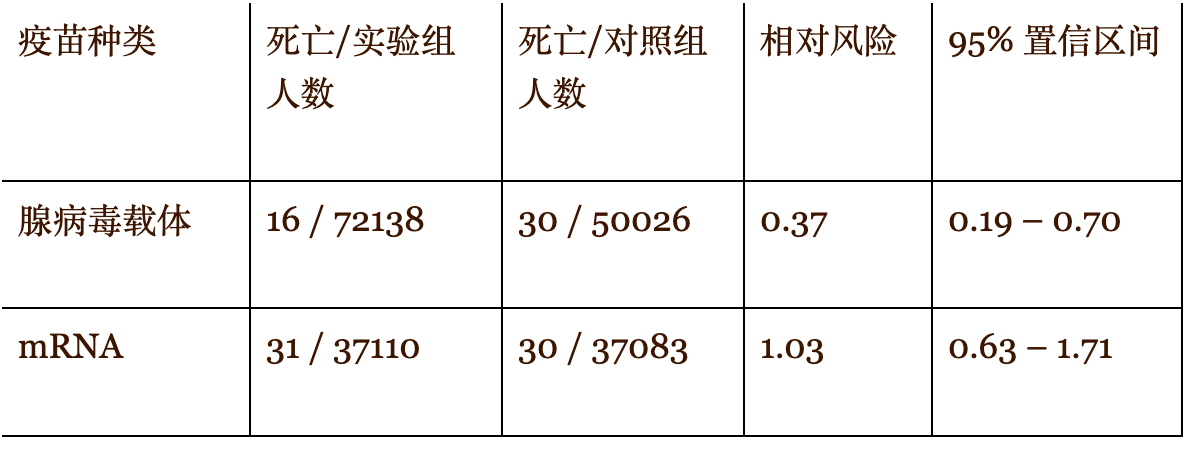
自由撰稿人,斯坦福大学统计学博士,原谷歌风投(GV)技术合伙人 个人微信公共号(lib sans woke)
Former Harvard professor Kulldorff: We gave the wrong new crown vaccine?
Original Author: Martin Kulldorff Published on Brownstown.org Translation: Zhang Tuomu
Core abstract : This article is an introduction to a recent research paper by former Harvard University professor Martin Kulldorff to the Danish team of Professor Christine Benn.
- After analyzing the clinical trial data of several new crown vaccines in Europe and the United States, the paper found that the Pfizer and Moderna vaccines had no effect on reducing all-cause mortality .
- The Johnson & Johnson vaccine and the Oxford vaccine had a significant effect on reducing the total number of deaths, with a reduction of 63%.
- Both Pfizer and Moderna's vaccine experimental designs have serious flaws.
- Perhaps millions of unnecessary deaths could have been prevented if governments and public health agencies had correctly interpreted the results of vaccine clinical trials and recommended different vaccines?
The results of the randomized controlled trial showed that the new crown vaccine based on the adenovirus vector had a significant reduction effect on all deaths (relative risk RR=0.37, 95% confidence interval 0.19-0.70), but the mRNA vaccine had no effect (relative risk RR=1.03, 95% % confidence interval 0.63-1.71).
This is the conclusion of a new study by the team of Professor Christine Benn from Denmark (see [1] for the paper link). Are we flooded with useless vaccines (Pfizer/Modna) instead of useful vaccines (Oxford/J&J)? Let's take a look at the study and some of the data here.
The most authoritative evidence in the medical field is the randomized controlled trial, because it avoids the bias of the researcher. And, one of the core indicators is death: Do these vaccines save lives? So this Danish study used the right data to answer the right question.
This is also the first paper to do such research.
When the US FDA approved the mRNA vaccines from Pfizer and Moderna, it was also based on randomized controlled trials. Randomized controlled trials submitted to the FDA by Pfizer and Moderna showed that their vaccines reduced symptomatic COVID-19 infections. Because the subjects in their trials were mainly young and middle-aged people who were already at little risk of death, these trials were not designed to answer the question of whether the vaccine would reduce death.
The question of whether deaths are reduced is taken as an inference, which may or may not be true. Moreover, the randomized controlled trial between Pfizer and Moderna was not designed to determine whether it can reduce infection. We will write a separate article on this issue in the future.
These vaccines were developed against COVID-19, but to properly evaluate a vaccine we must also look at non-COVID-19 deaths. Could there be unanticipated side effects leading to death? A vaccine that saves some lives but kills the same number of others is never what we want. Of course, vaccines may also have unexpected benefits, such as certain vaccines can also protect against certain other infections (see the link at the end of the article for related papers [2]). These are all things that should be considered in order to evaluate a vaccine fairly.
While each randomized controlled trial alone is insufficient to determine whether the new crown vaccine reduces overall mortality, the Danish study pooled multiple trials to increase the amount of data. There are mainly two new crown vaccines: Oxford, Johnson & Johnson, Sputnik (Russian satellite vaccine) based on adenovirus vectors, and Pfizer and Modena based on mRNA technology. Prof. Benn's team combined their data into these two categories. The result is as follows:

Clearly, the adenoviral vector vaccine reduced mortality. For every 100 deaths among placebo-vaccinated subjects, only 37 died in the vaccinated subjects (95% confidence interval, 19 to 70). The results come from five randomized controlled trials of three vaccines, but mainly the Oxford and Johnson vaccines.
However, for mRNA vaccines, there was no evidence of a reduction in mortality. For every 100 deaths among participants who received placebo, there were 103 deaths among those who received the vaccine (95% confidence interval, 63 to 171). In other words, mRNA vaccines may reduce mortality, or increase mortality, we don't know. Pfizer and Moderna contributed roughly equally to this result, so there's no evidence either is better or worse than the other.
Total death is critical to public health, but the scientific community is also very concerned about the impact of vaccines on different kinds of deaths. The Danish authors of the paper contacted the executors of these RCTs and obtained the causes of all deaths and grouped them into four categories: COVID-19, cardiovascular, accident or other causes .
For mRNA vaccines, COVID-19 deaths decreased, but cardiovascular deaths increased , neither of which was statistically significant. Therefore, both results may be caused by random factors. Vaccines have the potential to increase the risk of cardiovascular death while reducing COVID-19 deaths, we don't know. The Pfizer and Moderna RCTs were not designed to answer this question.
For the adenovirus vector vaccine, both new crown death and cardiovascular death were reduced , and both were statistically significant, which means that it is unlikely to be caused by random factors. Other deaths decreased slightly, possibly due to random causes.
The strength of the Danish study is that it was based on randomized controlled trials. Its main shortcoming is that the follow-up time is too short. And that's because vaccine makers ended trials early after receiving emergency approval.
Another weakness of this data is that it does not allow us to differentiate by age. While anyone can be infected, the risk of dying from COVID-19 differs by a factor of a thousand between the elderly and the young.
Do vaccines mainly reduce deaths in the elderly? This is a reasonable guess. What about young people? We don't know. This is not the fault of these Danish scholars. Based on data from randomized controlled trials funded by these major pharmaceutical companies, they couldn't have done better.
Some people may criticize that this Danish study has not yet been peer reviewed (peer review), but in fact it has been, and several colleagues and I have done peer review. We have decades of experience with this type of research. It's just peer review by anonymous reviewers who haven't gone through the journal, which I don't think matters that much.
FDA approval of mRNA vaccines is based on their effectiveness in reducing symptomatic infection, not on their ability to reduce death. When Pfizer and Moderna designed their randomized controlled trials, they didn't design whether they could reduce deaths, which they could have done. There is no justification for this practice.
The FDA excused their emergency approval. Many elderly people in the United States were dying from the new crown at that time, and the FDA had to make decisions based on the information available at the time.
It's different now, we know a lot more information. If Pfizer and Moderna want to keep selling their vaccines, we have to ask them to do a decent randomized controlled trial to prove that their vaccines actually reduce deaths.
Just as important, now that the data show that certain vaccines are not effective in reducing deaths, governments, large companies and universities must lift vaccine mandates.
【End of the full text】
Introduction to the original author

Martin Kulldorff: Former Harvard Medical School professor and epidemiologist. Born in Sweden in 1962. Developer of epidemiological surveillance and data mining software Free SaTScan, TreeScan and RSequential. He is a member of the US FDA Drug Safety and Risk Management Expert Committee and a former CDC consultant. One of the three co-founders of the Great Barrington Declaration. Leaving Harvard University in 2021 after ten years on the faculty.
Original title: Have People Been Given the Wrong Vaccine? Published on brownstone.org on April 22, 2022. The Brownstone Institute maintains open copyright (including translation rights).
English original link: https://brownstone.org/articles/have-people-been-given-the-wrong-vaccine/
further reading
[1] Lancet preprint, Christine Benn et al, April 5, 2022, Randomized Controlled Trials of COVID-19 Vaccines: Are Adenovirus Vaccines Beneficial? https://papers.ssrn.com/sol3/papers.cfm?abstract_id=4072489
[2] The Lancet Infectious Diseases, Christine Benn el al, October 2020, Vaccinology: Should the Paradigm Shift? https://pubmed.ncbi.nlm.nih.gov/32645296/
Like my work?
Don't forget to support or like, so I know you are with me..
Comment…